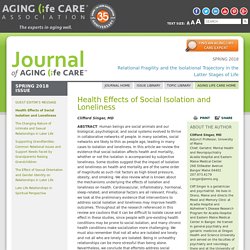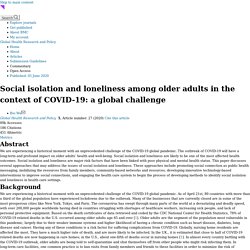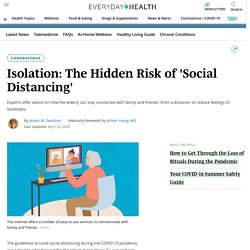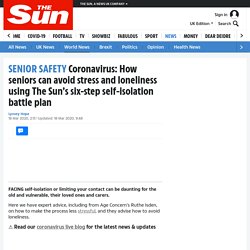

Definition of Social Isolation. Untitled. Untitled. Untitled. Health Effects of Social Isolation and Loneliness – Aging Life Care Association™ Clifford Singer, MD Adjunct Professor, University of Maine Chief, Geriatric Mental Health and Neuropsychiatry Acadia Hospital and Eastern Maine Medical Center 268 Stillwater Avenue Bangor Maine 04402 207.973.6179 csinger@emhs.org Cliff Singer is a geriatrician and psychiatrist.

Untitled. Impact of Social Isolation due to Covid19. Seniors felt less socially satisfied, more isolated during Covid-19 circuit breaker period: Survey, Singapore News. SINGAPORE - Social isolation during the circuit breaker period resulted in lower social satisfaction levels for senior citizens, according to results from a monthly survey of about 7,500 people aged between 55 and 75 here. Social satisfaction levels dipped by about 4 per cent in May when compared with data from January. In particular, for senior citizens living with others, satisfaction levels fell to the pre-circuit breaker levels of peers living alone, while those living alone saw even lower satisfaction levels as safe distancing measures made it more difficult to find support from friends and the community.
As of July, while satisfaction levels have rebounded after the circuit breaker period, which was from April 7 to June 1, they are not back to the levels they were at before. As Singapore's population ages, the proportion of those who remain single and live alone will increase, said Prof Straughan, a sociologist and former Nominated Member of Parliament.
Coronavirus: Elderly hit hard by social isolation amid circuit breaker measures, Health News. A needle and the television set - these two objects have been keeping 83-year-old Nellie Woo company from morning to night for the past week while she is holed up alone at home. She used to enjoy playing bingo and exercising with her elderly neighbours at the Senior Activity Centre (SAC) downstairs, as well as chatting with volunteers who visited her studio flat. Now that all activities for seniors - including home visits - have ceased due to strict circuit breaker measures, Madam Woo is feeling lonely and emotionally down. She thinks about suicide sometimes, and has spent so much time staring at her patchwork and TV lately that her doctor had to give her antibiotics for dry eyes.
For such elderly people, the ills that come with social isolation pose a significant health risk, say some seniors and social workers. Out of the 208,000 people who live alone in Singapore, at least a quarter of them are elderly. In 2016, there were 47,000 seniors aged 65 and above who lived by themselves. Social isolation and loneliness among older adults in the context of COVID-19: a global challenge. Social isolation is defined as the objective state of having few social relationships or infrequent social contact with others while loneliness is a subjective feeling of being isolated.

Social isolation and loneliness are serious yet underestimated public health risks that affect a significant portion of the older adult population. In the U.S., approximately one-quarter of community-dwelling older adults are considered to be socially isolated, and 43% of them report feeling lonely [2]. Untitled. How Seniors Can Overcome the Negative Effects of Isolation While Social Distancing. The guidelines around social distancing during the COVID-19 pandemic are a double-edged sword for the elderly living alone: Go out and risk exposure to coronavirus or stay home and risk feeling isolated and depressed.

The abrupt shifts in routines, the distance from grown children, and the cancellation of everything from church services to coffee dates can leave seniors feeling lonely, which raises stress levels, impedes sleep, and triggers depression and anxiety. “All of us need a sense of connection during times of uncertainty,” says M. Delores Cimini, PhD, a licensed psychologist and the director of the Center for Behavioral Health Promotion and Applied Research at the University of Albany in New York. “It’s not social distance but physical distance they recommended. We need physical distance from each other while maintaining social connection.” Here are five strategies that experts recommend to help seniors (and everyone else) stay connected while we’re physically apart. 1. Dr. 2. 3. Coronavirus: How seniors can avoid stress and loneliness using The Sun’s six-step self-isolation battle plan.
FACING self-isolation or limiting your contact can be daunting for the old and vulnerable, their loved ones and carers.

Here we have expert advice, including from Age Concern’s Ruthe Isden, on how to make the process less stressful, and they advise how to avoid loneliness. ⚠️ Read our coronavirus live blog for the latest news & updates Carers must plan for if they fall ill CARERS may be feeling incredibly anxious about the coronavirus pandemic if someone who is disabled or unwell is depending on them for support.
Matt Jones, helpline and advice manager at Carers UK, told The Sun it’s important to plan ahead. He says: “We are advising carers to have a contingency plan in place in case they fall ill. Untitled.